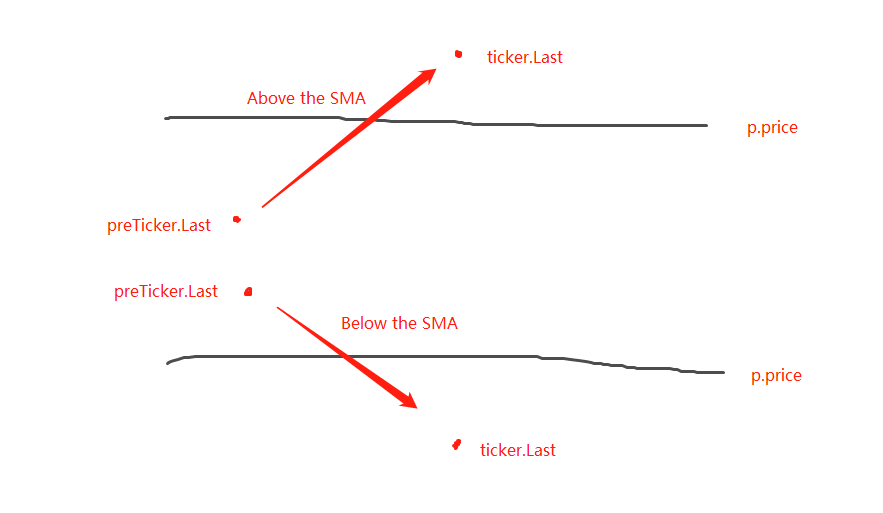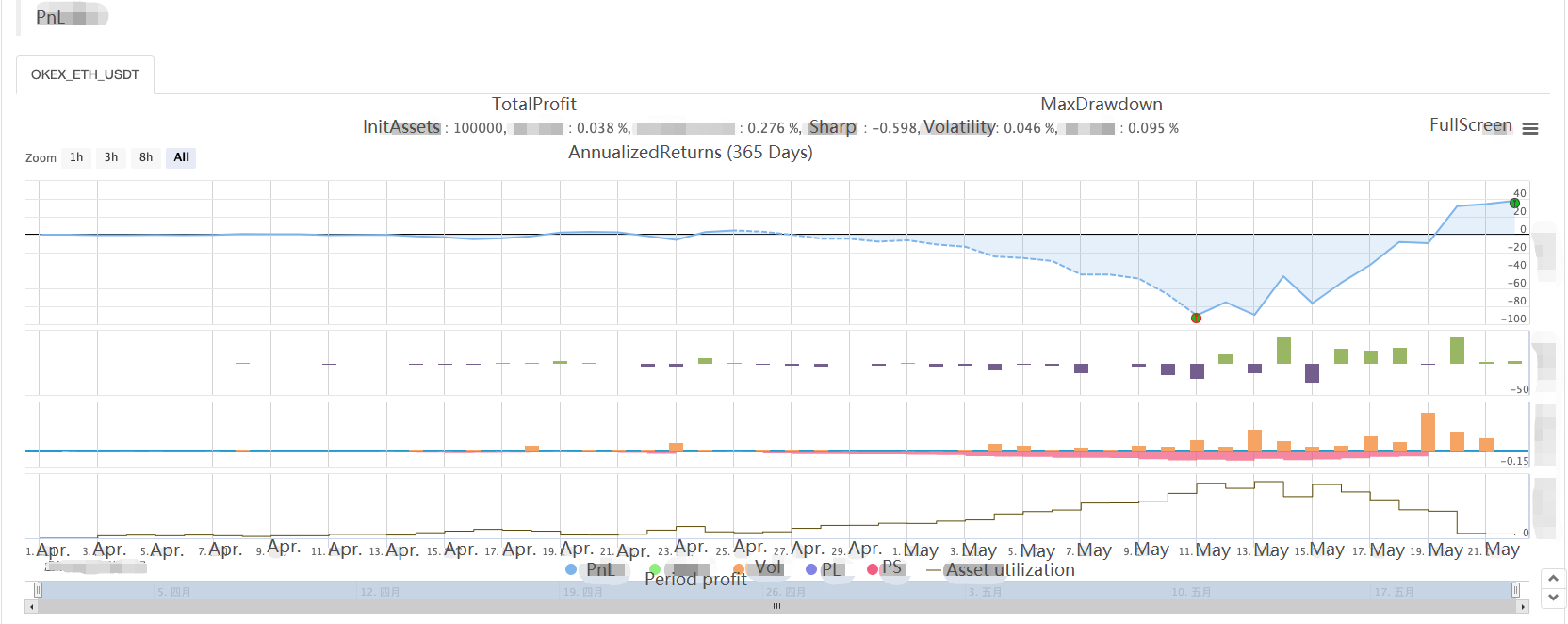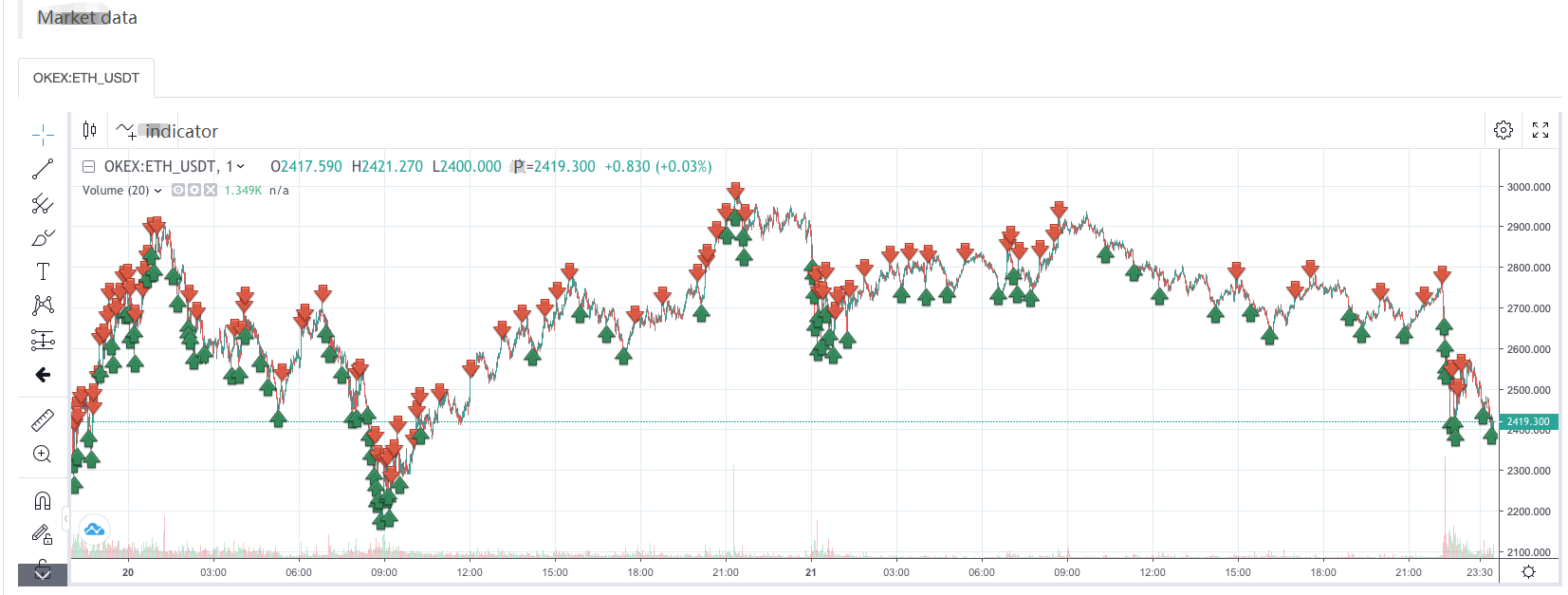초보자용 암호화폐 양적 거래 - 암호화폐 양적 거래에 더 가까워지도록 (5)
저자:FMZ~리디아, 창작: 2022-08-03 16:08:50, 업데이트: 2023-09-21 21:07:02
이전 기사에서는 간단한 그리드 전략의 거래 논리 분석을 설명했습니다. 이 기사에서는 이 튜토리얼 전략의 디자인을 계속 완료할 것입니다.
-
거래 논리 분석 이전 기사에서 언급했듯이, 각 그리드 라인을 가로질러 현재 가격의 위 또는 아래의 교차를 판단하여 거래 동작을 유발할 수 있습니다. 그러나 실제로는 여전히 많은 논리 세부 사항이 있으며 전략 글쓰기를 이해하지 못하는 초보자도 종종 논리가 매우 간단하며 코드가 몇 줄에 불과해야하지만 실제 글쓰기에서 발견되는 많은 세부 사항이 있습니다.
우리가 고려해야 할 첫 번째 세부 사항은 무한 격자 설계입니다.
createNet이 함수는 제한된 수의 그리드 라인을 가진 그리드 데이터 구조를 생성합니다. 그렇다면 전략이 실행될 때 가격이 이 그리드 데이터 구조의 경계를 넘어서면 (가격이 가장 높은 상위 그리드 라인과 가장 낮은 하위 그리드 라인을 넘어서면) 어떻게 될까요? 그래서 먼저 네트워크 데이터 구조에 확장 메커니즘을 추가해야 합니다.전략의 주요 함수를 작성하기 시작해 봅시다. 전략이 실행되기 시작하는 코드입니다.
var diff = 50 // Global variables and grid spacing can be designed as parameters for easy explanation. We write this parameter into the code. function main() { // After the real bot starts running, execute the strategy code from here var ticker = _C(exchange.GetTicker) // To get the latest market data ticker, please refer to the FMZ API documentation for the structure of the ticker data: https://www.fmz.com/api#ticker var net = createNet(ticker.Last, diff) // The function we designed in the previous article to construct the grid data structure initially, here we construct a grid data structure net while (true) { // Then the program logic enters this while infinite loop, and the strategy execution will continue to execute the code within the {} symbol here. ticker = _C(exchange.GetTicker) // The first line of the infinite loop code section, get the latest market data and update it to the ticker variable // Check the grid range while (ticker.Last >= net[net.length - 1].price) { net.push({ buy : false, sell : false, price : net[net.length - 1].price + diff, }) } while (ticker.Last <= net[0].price) { var price = net[0].price - diff if (price <= 0) { break } net.unshift({ buy : false, sell : false, price : price, }) } // There are other codes... } }그리드 데이터 구조를 확장할 수 있도록 하는 것은 다음 코드 (위 코드에서 추출된):
// Check the grid range while (ticker.Last >= net[net.length - 1].price) { // If the price exceeds the grid line of the highest price of the grid net.push({ // Just add a new grid line after the grid line with the highest price of the grid buy : false, // Initialize sell marker sell : false, // Initialize buy marker price : net[net.length - 1].price + diff, // dd a grid spacing to the previous highest price }) } while (ticker.Last <= net[0].price) { // If the price is lower than the grid line of the lowest price of the grid var price = net[0].price - diff // Different from adding upwards, it should be noted that the price of adding new grid lines downwards cannot be less than or equal to 0, so it is necessary to judge here if (price <= 0) { // Less than or equal to 0 will not be added, jump out of this loop break } net.unshift({ // Add a new grid line just before the grid line with the lowest price of the grid buy : false, sell : false, price : price, }) }다음 단계는 트레이딩 트리거를 구체적으로 구현하는 방법을 고려하는 것입니다.
var diff = 50 var amount = 0.002 // Add a global variable, which can also be designed as a parameter. Of course, for the sake of simplicity, we also write it in the strategy code. // This parameter controls the trade volume each time a trade is triggered on the grid line function main() { var ticker = _C(exchange.GetTicker) var net = createNet(ticker.Last, diff) var preTicker = ticker // Before the main loop (fixed loop) starts, set a variable to record the last market data while (true) { ticker = _C(exchange.GetTicker) // Check the grid range while (ticker.Last >= net[net.length - 1].price) { net.push({ buy : false, sell : false, price : net[net.length - 1].price + diff, }) } while (ticker.Last <= net[0].price) { var price = net[0].price - diff if (price <= 0) { break } net.unshift({ buy : false, sell : false, price : price, }) } // Retrieve grid for (var i = 0 ; i < net.length ; i++) { // Iterate over all grid lines in the grid data structure var p = net[i] if (preTicker.Last < p.price && ticker.Last > p.price) { // Above the SMA, sell, the current node has already traded, regardless of SELL BUY, it will no longer be traded if (i != 0) { var downP = net[i - 1] if (downP.buy) { exchange.Sell(-1, amount, ticker) downP.buy = false p.sell = false continue } } if (!p.sell && !p.buy) { exchange.Sell(-1, amount, ticker) p.sell = true } } else if (preTicker.Last > p.price && ticker.Last < p.price) { // Below the SMA, buy if (i != net.length - 1) { var upP = net[i + 1] if (upP.sell) { exchange.Buy(-1, amount * ticker.Last, ticker) upP.sell = false p.buy = false continue } } if (!p.buy && !p.sell) { exchange.Buy(-1, amount * ticker.Last, ticker) p.buy = true } } } preTicker = ticker // Record the current market data in preTicker, and in the next cycle, use it as a comparison between the "previous" market data and the latest one to judge whether to be above the SMA or below the SMA. Sleep(500) } }다음과 같은 것을 볼 수 있습니다.
- 격자선 위의 교차 조건:
preTicker.Last < p.price && ticker.Last > p.price - 격자선 아래를 통과하는 조건:
preTicker.Last > p.price && ticker.Last < p.price
이것은 우리가 이전 게시물에서 말한 것입니다.
- 격자선 위의 교차 조건:

SMA 이상 또는 SMA 이하가 될지 판단하는 것은 주문을 할 수 있는지 판단하는 첫 번째 단계일 뿐이고, 그리드 라인 데이터의 마크를 판단하는 것도 필요합니다.
만약 SMA보다 높다면, 가격은 현재 그리드 라인과 가장 가까운 그리드 라인의 구매 마크보다 낮다고 판단됩니다. 만약 구매 마크의 값이 사실이라면, 그것은 이전 그리드 라인이 구매되었고, 이전 구매 마크를 거짓으로 재설정하고, 현재 그리드 라인을 거짓으로 재설정하는 것을 의미합니다.
조건들을 판단한 후, 트리거가 없다면 계속 판단한다. 현재 그리드 라인의 구매/판매 마크가 모두 거짓이라면, 현재 그리드 라인이 거래될 수 있다는 뜻이다. 현재 그리드 라인이 SMA 위에 있기 때문에, 여기서 판매 작전을 수행할 것이다. 실행 후, 현재 그리드 라인의 판매 마크를 true로 표시한다.
처리 논리는 SMA 아래에서 동일한 것입니다.
전체 전략 백테스팅
백테스팅 중에 어떤 데이터를 보려면, 함수showTbl데이터를 표시하기 위해 작성되었습니다.
function showTbl(arr) {
var tbl = {
type : "table",
title : "grid",
cols : ["grid information"],
rows : []
}
var arrReverse = arr.slice(0).reverse()
_.each(arrReverse, function(ele) {
var color = ""
if (ele.buy) {
color = "#FF0000"
} else if (ele.sell) {
color = "#00FF00"
}
tbl.rows.push([JSON.stringify(ele) + color])
})
LogStatus(_D(), "\n`" + JSON.stringify(tbl) + "`", "\n account Information:", exchange.GetAccount())
}
전체 전략 코드:
/*backtest
start: 2021-04-01 22:00:00
end: 2021-05-22 00:00:00
period: 1d
basePeriod: 1m
exchanges: [{"eid":"OKEX","currency":"ETH_USDT","balance":100000}]
*/
var diff = 50
var amount = 0.002
function createNet(begin, diff) {
var oneSideNums = 10
var up = []
var down = []
for (var i = 0 ; i < oneSideNums ; i++) {
var upObj = {
buy : false,
sell : false,
price : begin + diff / 2 + i * diff,
}
up.push(upObj)
var j = (oneSideNums - 1) - i
var downObj = {
buy : false,
sell : false,
price : begin - diff / 2 - j * diff,
}
if (downObj.price <= 0) { // The price cannot be less than or equal to 0
continue
}
down.push(downObj)
}
return down.concat(up)
}
function showTbl(arr) {
var tbl = {
type : "table",
title : "grid",
cols : ["grid Information"],
rows : []
}
var arrReverse = arr.slice(0).reverse()
_.each(arrReverse, function(ele) {
var color = ""
if (ele.buy) {
color = "#FF0000"
} else if (ele.sell) {
color = "#00FF00"
}
tbl.rows.push([JSON.stringify(ele) + color])
})
LogStatus(_D(), "\n`" + JSON.stringify(tbl) + "`", "\n account Information:", exchange.GetAccount())
}
function main() {
var ticker = _C(exchange.GetTicker)
var net = createNet(ticker.Last, diff)
var preTicker = ticker
while (true) {
ticker = _C(exchange.GetTicker)
// Check the grid range
while (ticker.Last >= net[net.length - 1].price) {
net.push({
buy : false,
sell : false,
price : net[net.length - 1].price + diff,
})
}
while (ticker.Last <= net[0].price) {
var price = net[0].price - diff
if (price <= 0) {
break
}
net.unshift({
buy : false,
sell : false,
price : price,
})
}
// Retrieve grid
for (var i = 0 ; i < net.length ; i++) {
var p = net[i]
if (preTicker.Last < p.price && ticker.Last > p.price) { // Being above the SMA, sell, the current node has already traded, regardless of SELL BUY, it will no longer be traded
if (i != 0) {
var downP = net[i - 1]
if (downP.buy) {
exchange.Sell(-1, amount, ticker)
downP.buy = false
p.sell = false
continue
}
}
if (!p.sell && !p.buy) {
exchange.Sell(-1, amount, ticker)
p.sell = true
}
} else if (preTicker.Last > p.price && ticker.Last < p.price) { // Being below the SMA, buy
if (i != net.length - 1) {
var upP = net[i + 1]
if (upP.sell) {
exchange.Buy(-1, amount * ticker.Last, ticker)
upP.sell = false
p.buy = false
continue
}
}
if (!p.buy && !p.sell) {
exchange.Buy(-1, amount * ticker.Last, ticker)
p.buy = true
}
}
}
showTbl(net)
preTicker = ticker
Sleep(500)
}
}
전략 백테스팅:



그리드 전략의 특징을 볼 수 있습니다. 시장이 트렌딩할 때 큰 부동 손실이 발생하고 수익은 변동적인 시장에서 회복됩니다.
따라서 네트워크 전략은 위험하지 않습니다. 스포트 전략은 여전히
- 디지털 화폐의 리드-래그 스위트 소개 (3)
- 암호화폐의 리드-래그 중재에 대한 소개 (2)
- 디지털 화폐의 리드-래그 스위트 소개 (2)
- FMZ 플랫폼의 외부 신호 수신에 대한 논의: 전략 내 내장 Http 서비스와 함께 신호 수신에 대한 완전한 솔루션
- FMZ 플랫폼 외부 신호 수신에 대한 탐구: 전략 내장 HTTP 서비스 신호 수신의 전체 방안
- 암호화폐의 리드-래그 중재에 대한 소개 (1)
- 디지털 화폐의 리드-래그 스위트 소개 (1)
- FMZ 플랫폼의 외부 신호 수신에 대한 논의: 확장 API VS 전략 내장 HTTP 서비스
- FMZ 플랫폼 외부 신호 수신에 대한 탐구: 확장 API vs 전략 내장 HTTP 서비스
- 무작위 틱커 생성기에 기반한 전략 테스트 방법 논의
- 무작위 시장 생성기에 기반한 전략 테스트 방법을 탐구합니다.
- 디지털 화폐 인수 모델
- 거래에서 자신의 구세주라
- 가상화폐의 수동 선물 및 스팟의 헤지 전략
- 암호화폐 스팟 헤지 전략 설계 (1)
- 베어시장의 바닥에 적합한 영구 균형 전략
- 초보자용 암호화폐 양적 거래 - 암호화폐 양적 거래에 더 가까워지도록 (8)
- 초보자용 암호화폐 양적 거래 - 암호화폐 양적 거래에 더 가까워질 수 있습니다 (7)
- 초보자용 암호화폐 양적 거래 - 암호화폐 양적 거래에 더 가까워지도록 (6)
- FMZ 양자 거래 플랫폼의 주요 인터페이스의 개요와 구조
- 암호화폐 선물에 대한 마틴게일 전략 설계
- 초보자용 암호화폐 양적 거래 - 암호화폐 양적 거래에 더 가까워지도록 (4)
- 초보자용 암호화폐 양적 거래 - 암호화폐 양적 거래에 더 가까이 가도록 (3)
- 초보자용 암호화폐 양적 거래 - 암호화폐 양적 거래에 더 가까워지도록 (2)
- 초보자용 암호화폐 양적 거래 - 암호화폐 양적 거래에 더 가까워지도록 (1)
- 암호화폐 스팟 헤지 전략 설계 (2)
- FMZ에서 일반 프로토콜 계약 접근의 예
- 다중 거래소 스팟 스프레드 중재 전략 논리 공유
- 거래 전략을 구축하는 시각화 모듈 - 깊이
- KLineChart 함수를 사용하여 전략 그리기 디자인을 더 쉽게
- KLineChart 함수를 사용하여 전략 그래프 디자인을 더 간단하게 만듭니다.